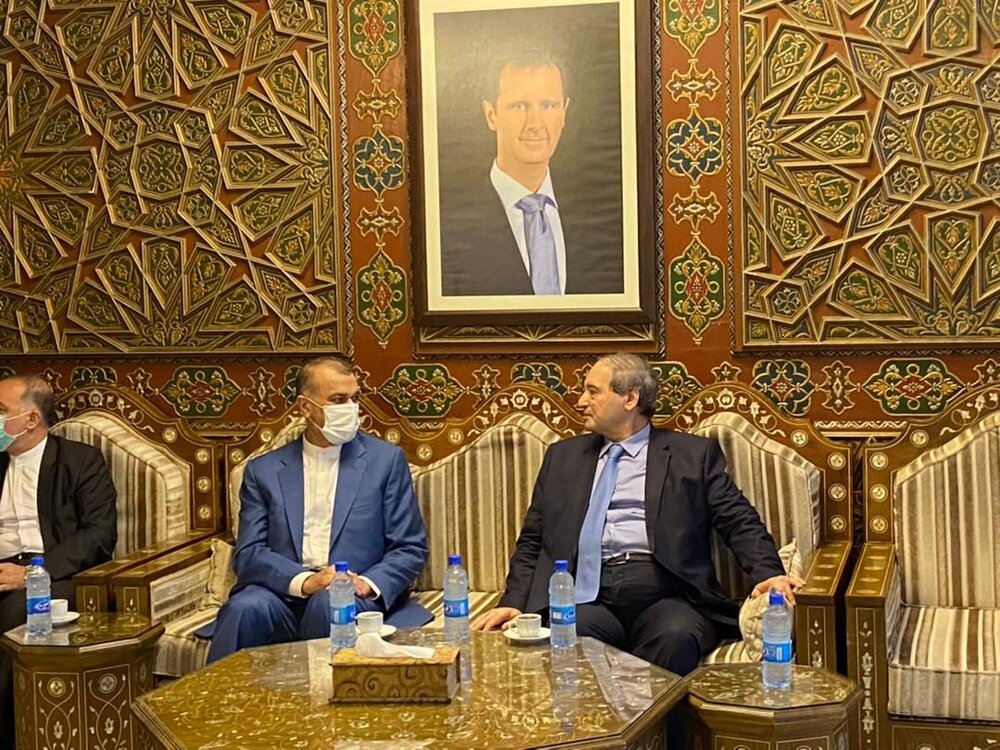Iran, Syria open new chapter in relations

TEHRAN – Iranian Foreign Minister Hossein Amir Abdollahian visited the Syrian capital on Saturday for talks aimed at further strengthening relations with the Arab country.
Amir Abdollahian’s visit to Syria is part of a regional tour that also included Turkey. The Iranian foreign ministry said the aim of the visit is to discuss bilateral issues and exchange views on regional and international developments.
Upon his arrival in Damascus, the Iranian foreign minister was received by his Syrian counterpart Faisal Mekdad, who described the visit as “very important that comes after a lot of local, regional and international developments,” according to Syrian state news agency SANA.
“We stand by Iran in the nuclear file and we support its stance in this regard,” Mekdad said.
The Iranian foreign minister also attached great importance to relations with Syria. He said that the latest visit of President Bashar al-Assad to Tehran was a turning point in the relations between the two countries, adding, “We have gone into a new stage in all domains.”
The visit comes amid successive developments in the region, including Israel’s attacks against Syria. The Syrian foreign minister said the situation in Syria required consultations between Tehran and Damascus, especially in light of Israel's attacks in Syria and its threats against Iran.
Amir Abdollahian’s trip coincided with another Israeli aggression against Syria on Saturday. SANA reported that two civilians were injured in Israeli missile aggression on a number of poultry farms in the vicinity of Hamidiya town, south of Tartous.
Citing a military source, it said the Israeli aggression occurred at 6:30 a.m. on Saturday from the direction of the west of the Lebanese city of Tripoli.
Mekdad said the aim of Israeli moves against Iran and Syria is to weaken the Axis of Resistance.
Amir Abdollahian condemned the Saturday aggression against Syria. “Iran condemns the Zionist aggression on southern Tartus this morning. The Zionist entity is always looking to destabilize security and stability in Syria and is trying with its attacks to show Damascus as an unsafe city to obstruct the return of the displaced Syrians,” he said.
Israeli attacks have elicited increasing criticism from Iran, Syria, and Russia in recent months.
On June 10, Israel targeted the tarmac of the Damascus airport, putting the airport out of commission for days because of the damage done to the runway. Speaking at a meeting of the UN Security Council, the First Deputy Permanent Representative of the Russian Federation to the UN, condemned Israel’s airstrikes on Damascus airport.
Russia even said it was preparing a proposal for a UN Security Council resolution condemning Israel. Earlier, Russia summoned the Israeli ambassador to Russia, Alexander Ben Zvi, to convey its protest over the attack. Mikhail Bogdanov, the deputy foreign minister of Russia, told the Israeli diplomat that Moscow wasn’t pleased with the justifications offered by Israel thus far and that it was waiting for additional clarifications “within the framework of the existing Russian-Israeli mechanism to prevent dangerous incidents in Syria.”
Given the growing cooperation between Iran and Syria, the two countries could amplify their defense cooperation to put an end to Israeli aggression. Tehran and Damascus have moved to strengthen their relations in various fields and that is no obstacle to boosting their defense cooperation.
